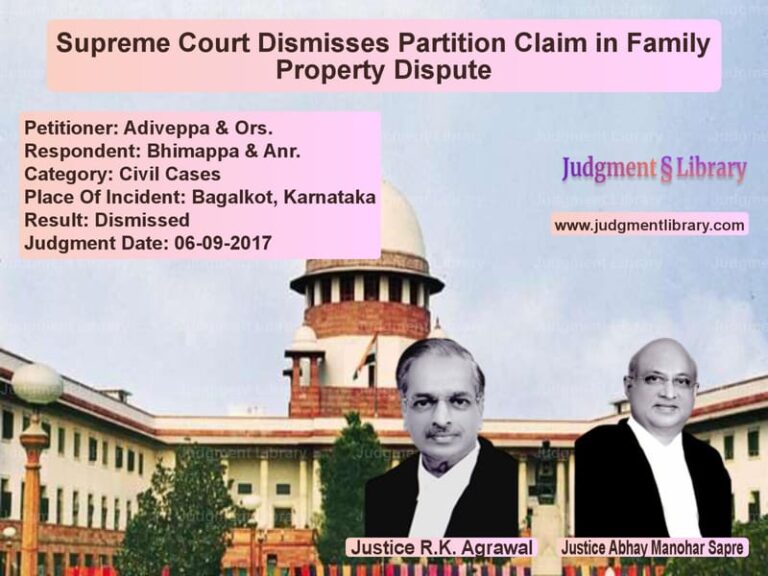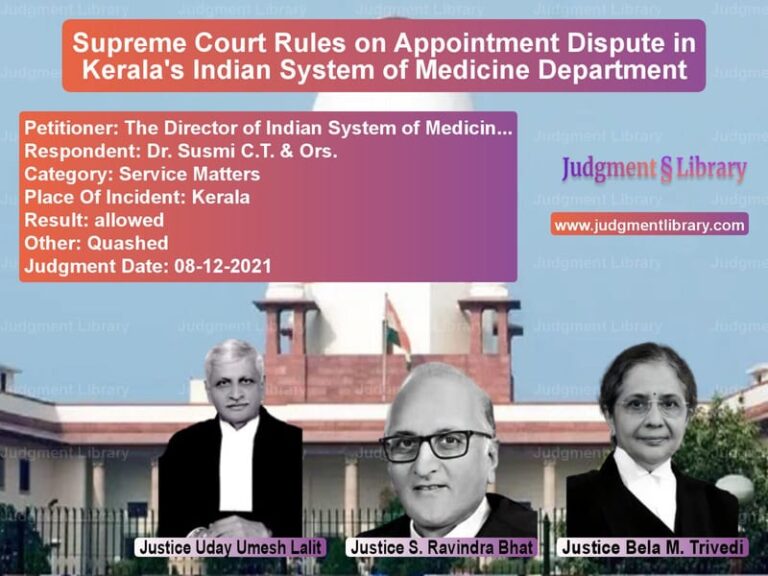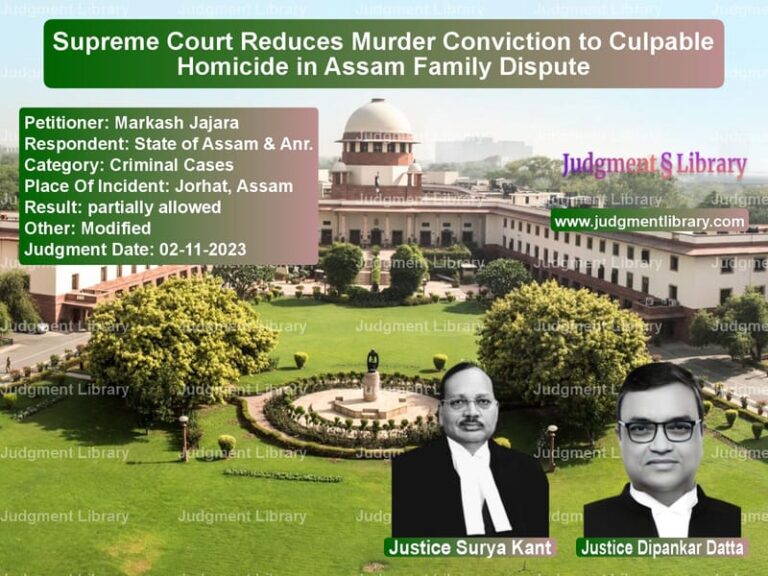Land Compensation Dispute: Supreme Court Upholds High Court’s Decision on Awala Trees and Borewell Compensation
The Supreme Court of India recently delivered a crucial judgment in the case of Manik Panjabrao Kalmegh vs. Executive Engineer Bembla Project Division Yavatmal & Ors., regarding compensation for land acquired by the Maharashtra government for the Vidarbha Irrigation Development Corporation. The judgment addressed issues of fair compensation, the legitimacy of awarding additional compensation for trees and a borewell, and the methodology for calculating incremental increases in land value.
Background of the Case
The dispute arose when the Maharashtra government acquired the appellant’s land—Survey Nos. 14, 15, and 17—located in Barad village, Babhulgaon, Yavatmal, Maharashtra, for irrigation purposes under the Vidarbha Irrigation Development Corporation. The acquisition was conducted through a notification issued on July 24, 2003, under Section 4 of the Land Acquisition Act, 1894.
The Land Acquisition Officer (LAO) initially awarded compensation as follows:
| Survey No. | Compensation per hectare | Additional Compensation |
|---|---|---|
| 14 | ₹83,099 | ₹7,27,669 for fruit-bearing trees |
| 15 | ₹83,245 | ₹23,600 for trees |
| 17 | ₹82,904 | No compensation for awala trees or borewell |
Unsatisfied with the award, the appellant accepted the compensation under protest and filed a reference under Section 18 of the Act, seeking an additional ₹2.06 crore in compensation. The Civil Judge, Senior Division, partially granted the request on April 4, 2015. Subsequently, the appellant sought a review, claiming that compensation for 1,824 awala (Indian gooseberry) trees and a borewell on Survey No. 17 had been overlooked. The review was allowed, and compensation was granted.
Appeal Before the High Court
Aggrieved by the review decision, the Maharashtra government appealed under Section 54 of the Act, arguing that compensation for trees and the borewell could not be granted in a review. Initially, the High Court admitted the appeal on this limited question but later expanded its scope to include the merits of the compensation claim. The appellant also filed cross-objections seeking further enhancement.
The High Court ultimately ruled in favor of the government, setting aside the compensation awarded for the awala trees and borewell. The appellant, dissatisfied with the ruling, approached the Supreme Court.
Legal Arguments
Petitioner’s Arguments
- Senior Counsel Pallav Sisodia, representing the appellant, argued that the compensation for land should have been calculated with a cumulative annual increase of 10%, based on a 1994 sale deed, rather than a simple increase.
- The appellant contended that the compensation for 1,824 awala trees and the borewell was validly granted in the review decision, based on a second Joint Measurement Report (JMR) dated July 8, 2015.
- Further, the appellant claimed that the lower court had granted compensation for only 500 orange trees, whereas there were actually 600.
Respondent’s Arguments
- Senior Counsel Uday B. Dube, representing the Maharashtra government, argued that there was no admissible evidence proving the existence of the awala trees and borewell before the land acquisition.
- The High Court had correctly ruled that the second JMR was inadmissible as evidence.
- Regarding the 10% yearly increase in land value, the government contended that such an increment is discretionary and not mandatory.
Supreme Court’s Observations and Ruling
On Compensation for Awala Trees and Borewell
The Supreme Court upheld the High Court’s decision, stating:
“Since the court in review jurisdiction could not have allowed any additional compensation as the evidence produced during review was inadmissible, the grant of compensation for borewell is also unsustainable.”
The Court reasoned that the original reference court had already rejected the claim for awala trees, as they were found to be newly planted and non-fruit-bearing at the time of acquisition. The review court’s reliance on the second JMR was misplaced, as this report was not produced as evidence in the original proceedings.
On Incremental Increase in Land Value
The appellant had sought a cumulative annual increase of 10% on the land value based on a 1994 sale deed. However, the Supreme Court ruled that such an increase is not automatic and depends on case-specific circumstances:
“In Ramrao Shankar Tapase v. Maharashtra Industrial Development Corporation (2022), this Court observed that a cumulative increase of 10-15% per year in land value may be accepted depending on the circumstances of the case. However, such an increase is not an absolute rule.”
The Court noted that the lower court had rightly applied a flat 10% annual increase, as there was no precedent for a cumulative increase in the related judgments.
On Additional Orange Trees
The appellant claimed that compensation for 600 orange trees should have been granted instead of 500. However, the Supreme Court found no evidence supporting this claim and stated that it was not raised before the High Court. Therefore, it could not be entertained at the Supreme Court level.
Final Judgment
The Supreme Court dismissed the appeal, affirming the High Court’s decision:
- The compensation granted in the review application for awala trees and the borewell was set aside.
- The methodology used for calculating land value with a flat 10% increase was upheld.
- The claim for additional orange trees was dismissed due to lack of supporting evidence.
Implications of the Judgment
The ruling establishes critical precedents for land acquisition cases:
- Compensation must be based on admissible evidence presented during the initial proceedings.
- Increments in land valuation are discretionary and not automatically cumulative.
- Compensation claims must be substantiated with proper evidence before the appellate process.
The Supreme Court’s decision underscores the importance of procedural adherence in land acquisition disputes and prevents misuse of review jurisdiction to introduce new compensation claims.
Petitioner Name: Manik Panjabrao Kalmegh.Respondent Name: Executive Engineer Bembla Project Division Yavatmal & Ors..Judgment By: Justice Pankaj Mithal, Justice R. Mahadevan.Place Of Incident: Yavatmal, Maharashtra.Judgment Date: 06-11-2024.
Don’t miss out on the full details! Download the complete judgment in PDF format below and gain valuable insights instantly!
Download Judgment: manik-panjabrao-kalm-vs-executive-engineer-b-supreme-court-of-india-judgment-dated-06-11-2024.pdf
Directly Download Judgment: Directly download this Judgment
See all petitions in Property Disputes
See all petitions in Damages and Compensation
See all petitions in Contract Disputes
See all petitions in Judgment by Pankaj Mithal
See all petitions in Judgment by R. Mahadevan
See all petitions in dismissed
See all petitions in Quashed
See all petitions in supreme court of India judgments November 2024
See all petitions in 2024 judgments
See all posts in Civil Cases Category
See all allowed petitions in Civil Cases Category
See all Dismissed petitions in Civil Cases Category
See all partially allowed petitions in Civil Cases Category







